Q&A with MR Macgill and Ho Nam
Donors for the Transforming Futures Program
Originally published at UCSC News Center by Joop Rubens
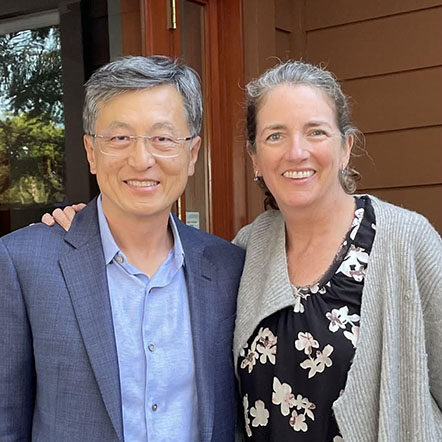
Transforming Futures—a pilot program launched by UC Santa Cruz’s Institute for Social Transformation—awarded seven first generation, underrepresented, and/or low-income UCSC students scholarships to pursue unpaid internships over the summer. The rollout of the program would not have been possible without the support of MR Macgill and Ho Nam. Their generosity created career-changing opportunities for seven UCSC students. UCSC Managing Director of Development for the Library and Social Sciences Joop Rubens sat down with donor MR Macgill for a conversation on why she and her husband chose to support UCSC.
How did you find out originally about UC Santa Cruz and our Everett program in particular?
MR: Our focus in our philanthropy is on breaking the cycle of poverty. And the way we feel best positioned to do this is by getting more first-generation students into, and through, four-year colleges. We particularly want to support students that have financial needs and give these students a genuine chance of getting into solid family-sustaining jobs.
I started by researching what the key barriers are for first generation students in both the Bay Area and Baltimore, Maryland, which are our two geographic areas we work in. I wanted to understand what kind of work had been successful so far in addressing the issues faced by first generation students and how we contribute effectively. What are the nuances that previous programs missed? What is the best practice and how do you further improve upon what is currently in place? It remains important to us to truly understand the key barriers to completion of a degree for first generation students. And in addition, we want to understand what prevents these students from getting that first job.
In trying to figure this out, we have been taking what I would call a “funnel approach.” I first interviewed high school principals of schools with a good number of first-generation students and asked them where their students were attending college, what universities their students selected and where they saw success happening. And the top recommended school was UC Santa Cruz. So I was happy to be introduced to the Dean of Social Sciences, Katharyne Mitchell. When I met Katharyne I was immediately impressed. She was well prepared for my questions, and it was obvious to me that she deeply cares about the success of first-generation students as well. She was extremely clear about what she needed. I explained to her what we were trying to do and where we saw our added value. Her response was positive and she listed a few professors who are really interested in strengthening the sense of belonging for students and in doing the type of programming we thought might work. It was a massive fit. And we actually talked about the plans for an internship program before we even talked about the Everett Program.
But in the process, we were introduced to the Everett Program. I will admit, it took me a while to understand the program exactly. And so, I asked for more exposure to it. The program has a lot of facets to it. It is not easy to explain in simple terms. But we were invited to attend one of the student-centered Everett events where students talked about their work and about how the program benefits them. We were so impressed. Here you have university students who have an authentic chance to work on projects in collaboration with existing community organizations. They explained how they helped to analyze and solve information and communication challenges around issues of social justice and environmental sustainability. These students impressed us a lot. The mentorship that is built into the model, the sense of belonging it brings to these students, etc. The experiences they were gaining will undoubtedly help them in the future when they enter the labor market.
Not everyone is passionate about the success of first-generation students. Why is this area so important to you and Ho?
MR: I would like to see things change because I consider myself an empathetic person and I don’t think the lines are drawn equally. Let’s put ourselves into the shoes of a student who is the first in her family to go to college. Imagine the difficulties she faces without mentorship. The experiences are not equal. Imagine being a person of color. You are dealing with institutional challenges that others never have to deal with. Challenges I did not have. I know that I was fortunate for being raised in a family that had gone to college. A family that was, in many ways, privileged. My parents and my family had built a social network that I benefited from. Ultimately, I had to work hard to get where I am today, but there were so many subtle and nuanced situations that I encountered that would have been much more challenging had I been the first in my family to go to college. We all know this. But if we do not graduate a more diverse population from our colleges first, how can we expect things to change?
We need to diversify who gets into university. But we then also need to complement the college experience before graduation. Good mentorship, practical work experience, strong faculty relationships are all a huge help to prepare a college student for the business world. It is one thing to earn your degree. But there are plenty of nuances that are not to be found in textbooks. Not showing up in shorts to a business suit environment, communicating in a professional manner, writing a good resume, listening skills, etc.
How do you stay focused on your vision?
MR: Of course, what started happening for us is that we received a lot of requests for donations. And originally, I said to my husband, we are not going to give to the obvious schools in the area. The schools that already raise a lot of funds. No. We are going to think about what’s most important to us and be very strategic about where to give. We both joined the boards of programs that seemed to fit our specific interests. I joined the board of the Spark program, which helps underserved middle school students understand the value of an education. Ho joined the board of You Aspire, which helps students get into college through financial counseling – An important cause because there are too many students that get in and get locked into bad loans. Many even drop out with these loans burdening them after the first year.
So, we started quite early with this work. But then, Silicon Valley was really good to us and we suddenly had more resources at our disposal. And frankly, I was somewhat uncomfortable with that. You can’t help but wonder why you are in that situation. And after a lot of reflection, one day, Ho said: “What if we give most of what we have away?” And that felt really good. It immediately felt like the right thing to do. And I feel good about our situation today, realizing that we are able to be generous and that we can work towards creating opportunities for many others.
Ho was an immigrant to the United States. When he came here, he benefited from a scholarship to attend Phillips Andover High School, which is one of the best schools in the country. His parents came over in part to pursue a better education for all of their children. Both of his parents were highly educated but once here, they had to start from nothing. And so I think he relates more to first-generation challenges. I would also add that Ho’s business is built less around making money per se, but more around creating solid job opportunities. As a VC he seeks out sustainable companies. Companies that create good jobs for people.
When we met Katharyne Mitchell and Chris Benner at UC Santa Cruz I felt we found programs that were insightful in addressing the underlying challenges to completing college. Some challenges are obvious. Financial struggles for instance. But the less obvious ones are also being recognized and being addressed by the programs we support at UC Santa Cruz. The sense of belonging, the practical mentorship, etc. I actually learned a lot from the thoughtfulness of your work and we are trying to emulate some of this to a certain extent in Maryland.
Studies show that there are roughly six to eight components that lend itself to success in working towards first generation college completion. It is things like giving students a sense of belonging, addressing imposter syndrome, offering a chance for students to work with near-peer advisors, and strong faculty engagement. Some of these components are subtle, and not easy to implement. You really need wraparound services. But when I talked to Katharyne, I immediately felt we were on the same page. She understands the key barriers and wants to address them. She introduced me to the Everett program, which was then further reinforced with how her and Chris developed the internship program that we’re also supporting now—Transforming Futures.
That program opens up opportunities and removes financial barriers for first-generation, underrepresented, and low-income college students at UC Santa Cruz so they can participate in career-advancing summer internships. It is clear that internships provide an important experiential learning opportunity for students to gain professional experience, build professional networks, create future career pathways, and are an important component of student success. But unfortunately, a number of meaningful internships are unpaid, particularly at nonprofit or government organizations, and therefore are not an option for many students with limited financial resources. In order to expand opportunities for these students, the program provides paid summer internship scholarships. But these students will be guided throughout the process and will receive training, mentorship, and peer support.
Again, small obstacles are often overlooked by any kind of support program. A simple thing like meeting with your faculty and going to faculty office hours is important. But in the case of the Everett program for instance, we listened to the students as some explained how as a first-generation student, early on, they experienced imposter syndrome and so did not advocate for themselves. The group experience and the peer support of that program helped them along slowly. You’re sending them in with people who have had the same experiences and so they can help guide them. The new students are guided by fellows and the fellows are guided by full-time staff and faculty. So as an Everett student you’re never left hanging without any support. When Ho and I listened to these students we agreed: Anyone would be perfectly happy hiring these students.
Back to the pilot internship program we are helping you launch this year, Transforming Futures. When I read that original proposal to us, I said, once again: You show me why I love working with UC Santa Cruz. So much usually gets overlooked. But Transforming Futures addresses a number of critical issues. The program will teach these students skills that universities don’t always address. Understanding how to interview, understanding how to write a resume, those are all critical skills.
Ultimately my passion lies in two areas. My primary interest is to address college completion. It would be amazing if I could ensure that in both Baltimore and the Bay Area, every city school student who wants it, has access to wraparound college completion services. And second to that would be to have all those people feel well-prepared for good and meaningful careers. And when I say college completion services, it’s everything we talked about. It’s peer advising, internships, belonging programs, emergency gap funding, tutoring, emotional support, social networks.
Click here to learn more about the Transforming Futures program. To support Transforming Futures scholarships at UCSC, contact Joop Rubens.

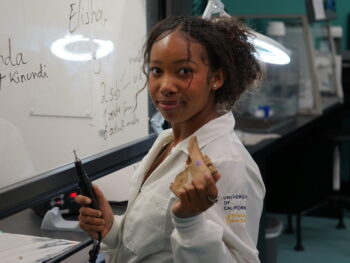
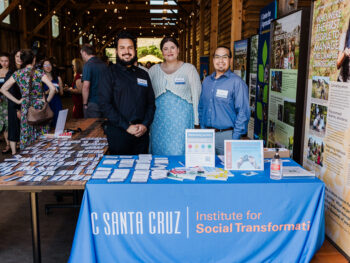
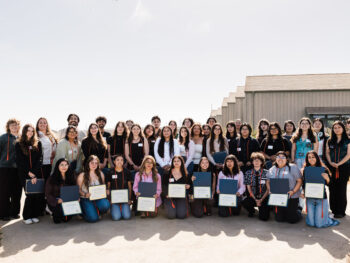
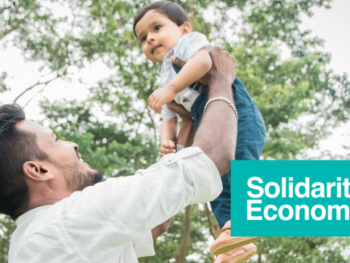
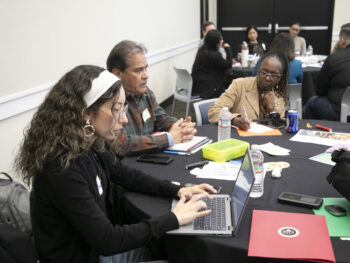
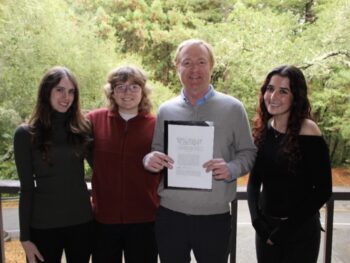
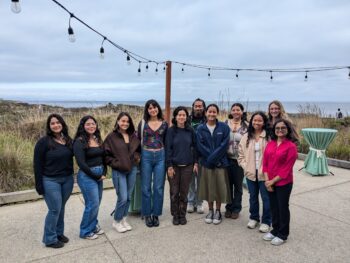
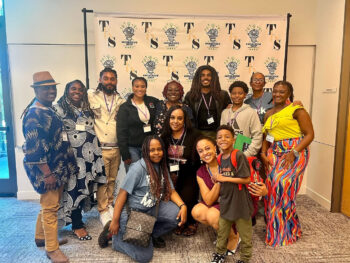
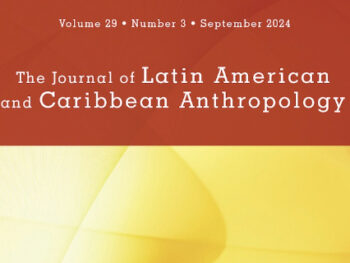
 Q&A with Amanda Safi
Q&A with Amanda Safi
